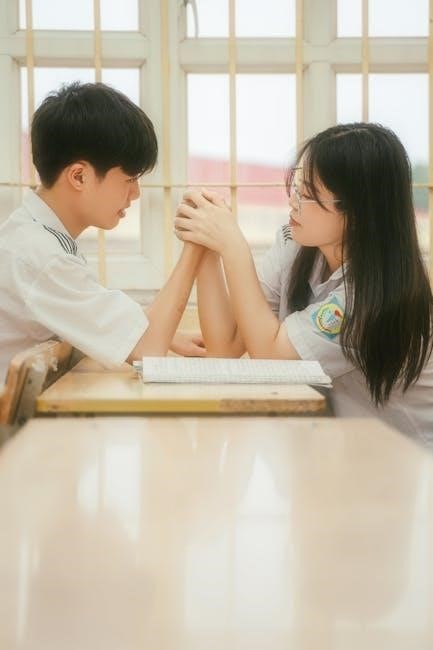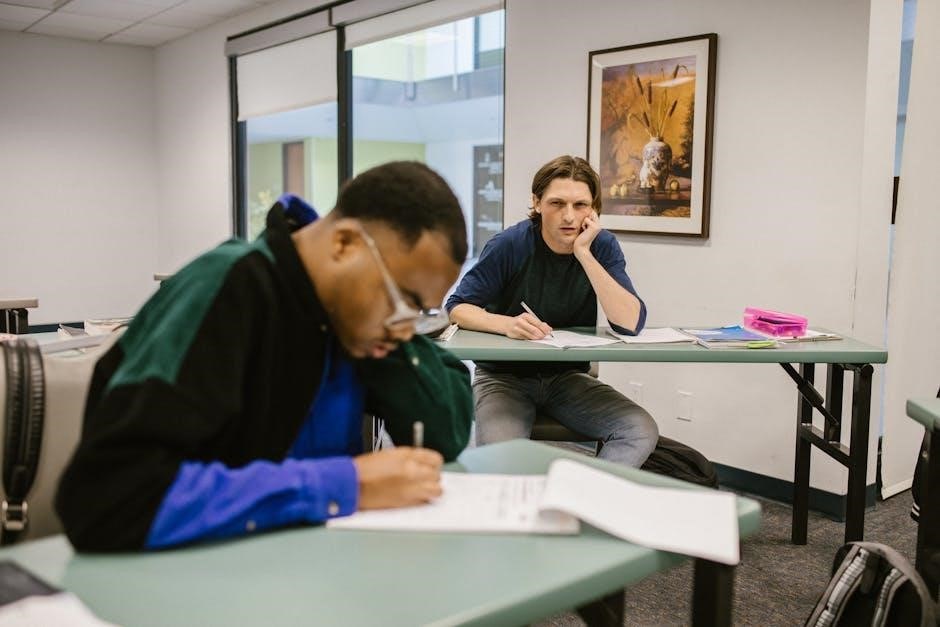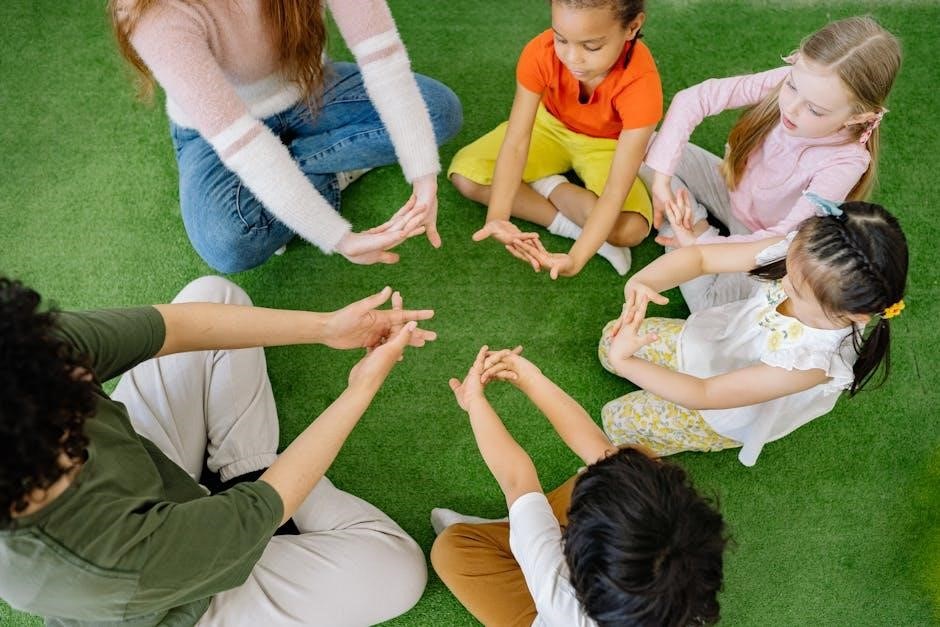High school competitions offer hands-on experiences across STEM, arts, and business, enabling students to showcase talents, build skills, and enhance academic profiles for future growth and opportunities.
1.1 Importance of Competitions
Competitions are vital for high school students as they foster innovation, creativity, and critical thinking. They provide platforms for students to showcase their talents, develop problem-solving skills, and gain recognition. By participating in STEM, arts, or business challenges, students enhance their academic profiles and prepare for college. Competitions also encourage teamwork, collaboration, and time management, which are essential for future success. They offer opportunities for networking and mentorship, helping students connect with professionals and gain insights into their fields of interest. Additionally, competitions promote healthy rivalry, motivating students to strive for excellence and push their boundaries. Overall, they are instrumental in shaping well-rounded individuals who are ready to tackle real-world challenges with confidence and skill.
1.2 Purpose of the Article
This article aims to provide high school students, educators, and parents with a comprehensive guide to challenges and competitions available globally. It highlights the significance of participating in these events, offering insights into their benefits and how they can shape a student’s academic and personal growth. The purpose is to equip students with the knowledge to identify competitions that align with their interests and skills, while also providing tips for preparation and success. By exploring various categories such as STEM, arts, and business, this guide encourages students to embrace opportunities that foster innovation, creativity, and critical thinking. Additionally, it serves as a resource for schools to integrate competitions into their curriculum, promoting a culture of excellence and readiness for future challenges. The ultimate goal is to inspire students to pursue their passions and excel in their chosen fields.

Types of Competitions
High school students can engage in diverse competitions, including STEM challenges, creative arts, writing contests, business entrepreneurship, and interdisciplinary events, each fostering unique skills and innovation.
2.1 STEM Challenges

STEM challenges are dynamic competitions that inspire high school students to explore science, technology, engineering, and mathematics. These events often involve problem-solving, innovation, and hands-on projects. For instance, the Science Olympiad tests knowledge in biology, chemistry, and physics, while Robotics and Engineering Challenges require students to design and build functional robots or models. The SeaPerch International Challenge focuses on underwater robotics, where students create robots to complete specific tasks. Such competitions not only enhance technical skills but also foster teamwork and critical thinking. They provide platforms for students to address real-world issues, such as environmental sustainability or healthcare, through creative solutions. By participating in STEM challenges, students gain practical experience, preparing them for future careers in technology and science. These events are essential for nurturing innovation and equipping the next generation with essential skills for a rapidly evolving world.
2.2 Creative Arts Competitions
Creative arts competitions provide high school students with opportunities to express their imagination and talent. These events cover various mediums, including visual arts, photography, writing, and digital design. For example, the Student Challenge Competition invites students to submit original games and artwork, while other contests focus on photography, video production, or creative writing; Such competitions allow students to explore their artistic side, develop creative thinking, and gain recognition for their work. They also offer a platform for self-expression and innovation, encouraging students to push boundaries and showcase their unique perspectives. By participating in creative arts competitions, students can build portfolios, enhance their skills, and potentially discover career paths in the arts. These events are vital for nurturing creativity and providing students with outlets to share their vision and talent with wider audiences.
2.3 Writing and Essay Contests
Writing and essay contests are excellent platforms for high school students to showcase their literary talents and critical thinking skills. These competitions often focus on specific themes, encouraging students to express their ideas creatively and persuasively. Topics can range from social issues to personal narratives, allowing participants to explore diverse subjects. For instance, poetry contests and creative writing challenges enable students to experiment with language and style, while essay contests emphasize research and argumentation. Such events not only enhance writing abilities but also foster a deeper understanding of various disciplines. Many contests offer scholarships, recognition, and publication opportunities, making them valuable for college applications. By participating, students can refine their communication skills, gain confidence, and demonstrate their intellectual and creative capabilities. These contests are a great way to nurture a love for writing and prepare students for future academic and professional challenges.
2.4 Business and Entrepreneurship Competitions
Business and entrepreneurship competitions provide high school students with opportunities to develop essential skills in innovation, leadership, and financial literacy. These events often involve creating business plans, pitching ideas, and solving real-world economic challenges. For example, the High School Fed Challenge requires students to analyze economic data and present monetary policy recommendations. Similarly, competitions like the 3M Young Scientist Challenge encourage students to develop innovative solutions to global issues, fostering entrepreneurship and critical thinking. Such contests not only prepare students for careers in business but also teach them how to navigate market trends, manage finances, and collaborate effectively. By participating, students gain practical experience and confidence, making these competitions a valuable addition to their academic journey. They also offer a platform to showcase creativity and problem-solving abilities, often with opportunities for scholarships and mentorship.
2.5 Interdisciplinary Challenges
Interdisciplinary challenges are designed to integrate multiple subjects, fostering a holistic approach to problem-solving. These competitions encourage students to think creatively and apply knowledge from diverse fields such as science, technology, engineering, arts, and mathematics (STEAM). For instance, the Global Academic Challenge and the SeaPerch International Challenge require students to combine technical skills with innovative thinking. Such events often involve real-world scenarios, prompting students to design solutions that address global issues like environmental sustainability or healthcare. By engaging in these challenges, students develop critical thinking, adaptability, and collaboration skills. These competitions also provide a platform for students to showcase their ability to merge different disciplines, preparing them for complex, real-world problems. Interdisciplinary challenges are particularly valuable for students interested in pursuing careers that require a multifaceted approach to innovation and problem-solving. They foster a deeper understanding of how different fields intersect and influence one another.

Benefits of Participating
Participating in competitions enhances skill development, boosts academic profiles, and fosters teamwork, networking, and college readiness, preparing students for future success and real-world challenges.
3.1 Academic and Skill Development
Competitions for high school students significantly enhance academic and skill development by fostering critical thinking, problem-solving, and creativity. These challenges expose students to real-world scenarios, encouraging them to apply theoretical knowledge practically. For instance, STEM competitions like robotics and engineering challenges help students develop technical skills, while creative arts contests nurture innovation and self-expression. Writing and essay contests refine communication and analytical abilities, preparing students for advanced academic pursuits. Moreover, these opportunities allow students to identify and strengthen their weaknesses, building confidence and resilience. The structured nature of competitions ensures that participants learn to approach problems systematically, a skill valuable in both academic and professional contexts. By engaging in these activities, students not only enhance their academic profiles but also gain a competitive edge for future endeavors, making competitions an invaluable tool for holistic development.
3.2 College Preparation and Admissions

Participating in competitions significantly strengthens a high school student’s college application by showcasing their skills, dedication, and achievements. These events demonstrate a student’s ability to excel under pressure and think critically, traits highly valued by admissions committees. Competitions also provide opportunities to gain recognition through awards, certificates, and scholarships, which highlight a student’s commitment to their field of interest. Furthermore, the experience gained from competitions, such as presenting solutions or creating projects, prepares students for the academic rigor and collaborative environments found in higher education. A strong track record in competitions can set a student apart in a competitive admissions landscape, signaling their readiness to succeed at the collegiate level and beyond. Thus, competitions serve as both a preparation tool and a distinguishing factor for aspiring college students.
3.3 Teamwork and Collaboration Opportunities
Competitions provide high school students with invaluable teamwork and collaboration experiences. Many challenges require participants to work in groups, fostering communication, problem-solving, and mutual respect among team members. These experiences mirror real-world scenarios, preparing students for future professional environments. Collaborative competitions encourage students to share ideas, delegate tasks, and rely on each other’s strengths, promoting a sense of unity and shared purpose. Through teamwork, students learn to navigate differing perspectives and conflicts, enhancing their interpersonal skills. Additionally, the bonds formed during these activities often lead to lasting friendships and professional networks. By engaging in team-based competitions, students develop the ability to work effectively with others, a skill that is essential for success in both academic and professional settings. Such collaborative experiences are a cornerstone of personal and educational growth for high school students.
3.4 Networking and Mentorship
Participating in competitions provides high school students with exceptional networking opportunities, allowing them to connect with peers, educators, and industry professionals. These interactions often lead to meaningful relationships that can influence future academic and career paths. Competitions also offer access to mentorship programs, where experienced individuals guide students in refining their skills and understanding industry expectations. Such mentorship fosters personal growth and provides valuable insights into real-world challenges. Additionally, networking events and workshops associated with competitions enable students to learn from others’ experiences, gain new perspectives, and build confidence in their abilities. These connections often extend beyond the competition itself, creating long-term support systems that can aid students in their educational and professional journeys. By engaging with diverse individuals, students develop a broader understanding of their field of interest and gain the tools needed to succeed. These experiences are invaluable for shaping their future endeavors and aspirations.

Preparation and Success Tips
Preparation is key to excelling in high school competitions. Researching opportunities, practicing consistently, collaborating with peers, and managing time effectively are essential strategies for success.
4.1 Researching Competitions
Researching competitions is a crucial step for high school students to identify opportunities that align with their interests and skills. By exploring various lists and resources, students can find competitions that match their academic strengths, whether in STEM, arts, or business. Many organizations offer curated lists of challenges, such as the 3M Young Scientist Challenge or the SeaPerch International Challenge, which cater to specific subjects like science or robotics. Students should also look into deadlines, eligibility criteria, and the types of challenges involved to ensure they are well-prepared. Utilizing online platforms and educational websites can provide access to comprehensive guides and PDF lists, making it easier for students to discover and select the most suitable competitions. This thorough research ensures that students can focus on opportunities that will help them grow academically and personally.
4.2 Practicing and Rehearsing
Practicing and rehearsing are essential for high school students to excel in competitions. Consistent practice helps students refine their skills, whether in STEM challenges, creative arts, or essay writing. For example, participants in the Science Olympiad or Mathematics Competitions benefit from solving practice problems and reviewing past exams. Robotics and engineering challenges require hands-on experimentation and iteration to perfect designs. Creative Writing Contests demand drafting and revising pieces to meet high standards. Rehearsing presentations and pitches, as in the High School Fed Challenge, ensures confidence and clarity. Regular practice not only builds familiarity with competition formats but also helps students identify and improve weak areas. By simulating competition scenarios, students can adapt to time constraints and pressure, ultimately enhancing their performance. Seeking feedback from mentors or coaches further refines their approach, ensuring they are well-prepared for the challenges ahead.
4.3 Building Strong Teams
Building strong teams is crucial for success in high school competitions, particularly in collaborative challenges like robotics, engineering, and business contests. Effective teams combine diverse skills, fostering innovation and problem-solving. Students should focus on clear communication, defined roles, and mutual respect to ensure cohesive collaboration. For instance, in competitions such as the Science Olympiad or SeaPerch International Challenge, teamwork is vital for designing and building functional models or underwater robots. Encouraging active participation and idea-sharing strengthens team dynamics and leads to better outcomes. Additionally, mentors or coaches can guide students in conflict resolution and goal-setting. Strong teams not only enhance performance but also create lasting bonds and shared achievements. By fostering a collaborative environment, students can maximize their potential and bring recognition to their schools, as seen in competitions where well-performing teams often highlight their institutions; Building strong teams is thus a cornerstone of success in competitive events.
4.4 Time Management and Deadlines

Effective time management is essential for high school students participating in competitions, as deadlines often dictate the success of their entries. Procrastination can lead to rushed submissions, compromising quality and creativity. Students should create detailed timelines, breaking tasks into manageable steps and prioritizing critical components. Tools like digital calendars or planners can help track progress and ensure timely completion. For example, in competitions like the Federal Reserve’s High School Fed Challenge, teams must submit detailed monetary policy recommendations within strict deadlines. Meeting these requires consistent effort and adherence to schedules. Additionally, understanding competition rules and requirements upfront saves time and reduces last-minute stress. By mastering time management, students can submit polished work, showcasing their skills and increasing their chances of success in competitive events. This skill also translates to academic and professional endeavors, making it a valuable lifelong habit.

Popular Competitions
Popular competitions for high school students include a variety of challenges across STEM, arts, and business, offering platforms to showcase talents and skills both locally and internationally.

5.1 Science Olympiad
The Science Olympiad is a prestigious competition that challenges high school students in various scientific disciplines, fostering critical thinking and innovation. It encompasses events in physics, chemistry, biology, and engineering, encouraging students to apply theoretical knowledge to practical problems. Participants engage in hands-on activities, from building robotic systems to conducting experiments, while developing teamwork and problem-solving skills. The National Science Olympiad in India and similar events worldwide attract thousands of students, providing a platform to showcase their scientific prowess. By participating, students gain recognition, enhance their academic portfolios, and prepare for advanced scientific studies. The competition also promotes a deeper understanding of STEM fields, inspiring future scientists and innovators. Its global reputation makes it a key event for students passionate about science and technology, offering opportunities to compete at regional, national, and international levels.
5.2 Mathematics Competitions
Mathematics competitions are a cornerstone of academic challenges for high school students, fostering problem-solving skills, logical reasoning, and precision. Events like the AMC (American Mathematics Competitions) and the International Mathematical Olympiad (IMO) provide global platforms for students to showcase their mathematical prowess. These competitions often involve solving complex problems under time constraints, preparing students for advanced mathematical studies and STEM careers. Many competitions, such as the Richmond County Mathematics Competition, cater to specific age groups, offering opportunities for students to compete at regional, national, and international levels. Participating in these events not only enhances academic portfolios but also builds confidence and critical thinking abilities. Mathematics competitions are a vital way for students to challenge themselves, collaborate with peers, and gain recognition in the field of mathematics. They serve as a stepping stone for future scholars and innovators in mathematics and related disciplines.

5.3 Robotics and Engineering Challenges
Robotics and engineering challenges are dynamic platforms for high school students to innovate, design, and build functional solutions to real-world problems. Competitions like the SeaPerch International Challenge and the International Robotronics Competition (IRC) encourage students to create underwater robots or design robotic systems for specific tasks. These events foster teamwork, critical thinking, and hands-on engineering skills. Students often work on projects such as building functional models of satellites or developing solutions to environmental challenges. Robotics competitions also provide opportunities for students to present their creations and receive feedback from industry experts. By participating, students gain practical experience in STEM fields, preparing them for future careers in engineering and technology. These challenges not only enhance technical abilities but also cultivate creativity and problem-solving, making them invaluable for aspiring innovators. They serve as a gateway to explore the intersection of technology and creativity while building a strong foundation for future academic and professional pursuits.
5.4 Creative Writing Contests
Creative writing contests provide high school students with platforms to express their imagination and showcase their literary talents. These contests often feature categories such as poetry, short stories, and essays, allowing students to explore various writing styles. Many competitions are designed to encourage creativity and critical thinking, while others focus on specific themes or genres. For example, the Richmond County Middle & High School Mathematics Competition includes creative writing as part of its broader academic challenges. Students can submit original works and receive feedback from judges, helping them refine their writing skills; Participating in these contests not only fosters a love for writing but also builds confidence and enhances college applications. Additionally, some competitions offer publication opportunities, giving students a chance to share their work with a wider audience. Creative writing contests are a valuable way for students to grow as writers and thinkers while connecting with like-minded peers. They serve as a celebration of storytelling and self-expression, inspiring students to pursue their passion for writing.
Participating in high school competitions fosters growth, creativity, and critical thinking, preparing students for future challenges. Embrace these opportunities to shine and build a strong foundation for success.
6.1 Encouragement and Final Thoughts
Participating in high school competitions is a transformative experience that fosters growth, creativity, and critical thinking. Students gain invaluable skills, such as collaboration, problem-solving, and time management, while building confidence and resilience. These challenges not only enhance academic profiles but also open doors to networking, mentorship, and college opportunities. Whether in STEM, arts, or business, there’s a competition for every interest. Embrace these opportunities to showcase talents, explore passions, and learn from peers. The journey may be challenging, but the rewards—both personal and professional—are immeasurable. Encourage yourself to step out of your comfort zone and strive for excellence. Remember, every competition is a chance to grow and shine, shaping a brighter future for years to come.



